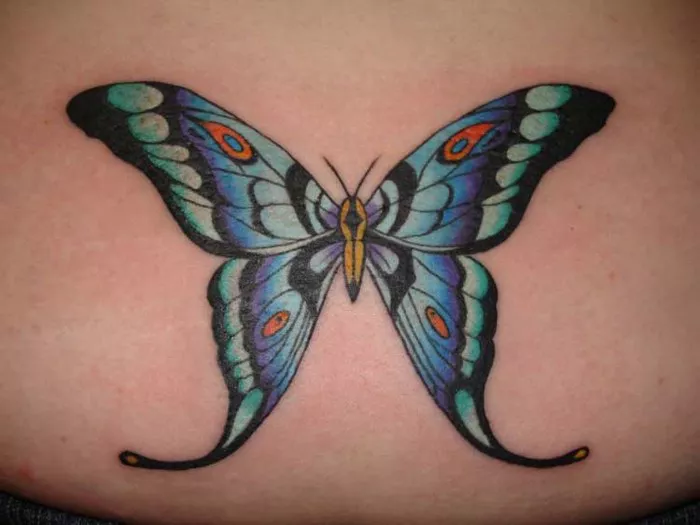Tattoos have long been a form of self-expression, with each design holding unique meanings to the individual who bears it. Among the myriad of tattoo designs, the butterfly tattoo has garnered attention and sparked speculation regarding its association with eating disorders. This article aims to delve into the origins of this belief, examine the psychological underpinnings, and ultimately debunk the myth surrounding the butterfly tattoo and eating disorders.
The Origins of the Myth:
The butterfly tattoo myth linking it to eating disorders likely stems from its symbolic association with transformation and metamorphosis. Eating disorders, such as anorexia nervosa and bulimia nervosa, often involve a profound dissatisfaction with one’s body and a desire for transformation. Consequently, some individuals may erroneously interpret the butterfly tattoo as a representation of this desire to undergo physical transformation through extreme dietary measures.
Furthermore, societal misconceptions and stereotypes surrounding eating disorders may have contributed to the propagation of this myth. Media portrayals often depict individuals with eating disorders as emaciated and frail, reinforcing the idea that a butterfly tattoo serves as a covert signal for such conditions. However, this oversimplified narrative fails to capture the complexity of eating disorders and perpetuates harmful stereotypes.
Understanding the Symbolism of the Butterfly Tattoo:
To unravel the truth behind the butterfly tattoo myth, it is essential to explore its symbolism beyond surface-level interpretations. Historically, butterflies have been emblematic of various themes, including beauty, freedom, and resilience. In many cultures, the butterfly is seen as a symbol of transformation and rebirth, owing to its remarkable metamorphosis from a caterpillar to a majestic winged creature.
Individuals who choose to adorn themselves with a butterfly tattoo often do so to convey personal meanings that align with these broader themes. For some, it may symbolize a journey of self-discovery and personal growth, akin to the butterfly’s transformative process. Others may associate it with overcoming adversity and emerging stronger, much like the butterfly breaking free from its cocoon.
Psychological Insights into Eating Disorders:
Contrary to popular belief, the decision to get a butterfly tattoo does not inherently signify an underlying eating disorder. While body image concerns may play a role in both the development of eating disorders and the choice of certain tattoo designs, it is crucial to recognize that correlation does not imply causation.
Eating disorders are complex mental health conditions influenced by a myriad of factors, including genetics, psychological predispositions, sociocultural pressures, and interpersonal dynamics. Individuals with eating disorders often experience profound emotional distress and struggle with distorted perceptions of body image, food, and self-worth.
Rather than attributing significance to external symbols such as tattoos, it is imperative to address the underlying psychological factors driving disordered eating behaviors. Therapeutic interventions, such as cognitive-behavioral therapy (CBT), dialectical behavior therapy (DBT), and family-based treatment (FBT), focus on challenging maladaptive thoughts and behaviors, fostering self-acceptance, and promoting healthier coping mechanisms.
Debunking the Myth:
While it is understandable why some may draw parallels between the butterfly tattoo and eating disorders, it is essential to challenge this misconception with empirical evidence and clinical expertise. Research studies examining the relationship between tattoos and eating disorders have failed to establish a causal link between the two.
Moreover, perpetuating the myth of the butterfly tattoo as a symbol of an eating disorder only serves to stigmatize both individuals with tattoos and those struggling with eating disorders. This harmful stereotype can deter individuals from seeking help for their mental health concerns and perpetuate feelings of shame and isolation.
Instead of succumbing to unfounded assumptions, society must strive to foster greater understanding and empathy towards individuals with diverse experiences and expressions of self. Recognizing that tattoos are personal choices driven by individual narratives can help dismantle harmful stereotypes and promote a more inclusive and supportive environment for all.
Conclusion:
In conclusion, the notion that a butterfly tattoo symbolizes an eating disorder is a myth perpetuated by misconceptions and societal stereotypes. While the butterfly tattoo may evoke themes of transformation and metamorphosis, its meaning is inherently subjective and varies from person to person.
Rather than making unfounded assumptions based on outward appearances, it is essential to approach individuals with empathy, compassion, and an open mind. Addressing the complexities of eating disorders requires a nuanced understanding of the underlying psychological factors and a commitment to destigmatizing mental health conditions.
By debunking myths and challenging harmful stereotypes, we can create a more inclusive and supportive society where individuals feel empowered to embrace their identities and seek help without fear of judgment or discrimination. The butterfly tattoo may flutter with symbolism, but it does not carry the weight of an eating disorder.

